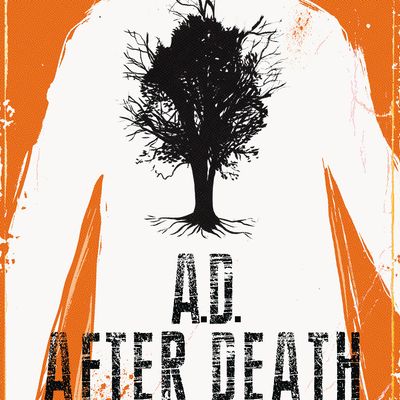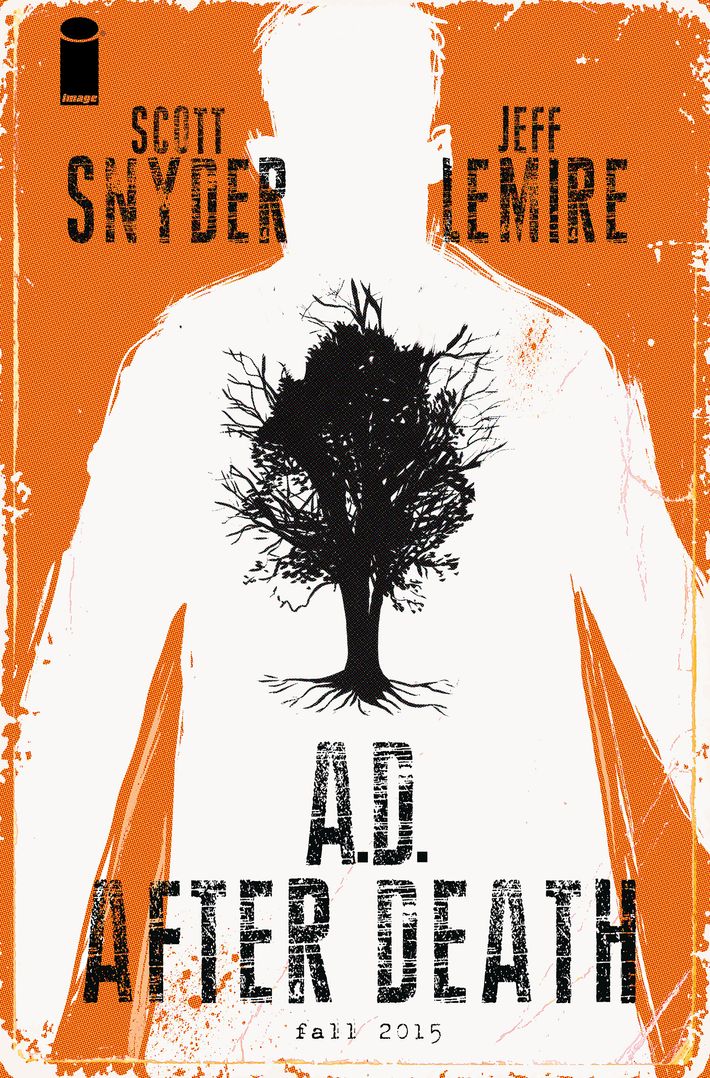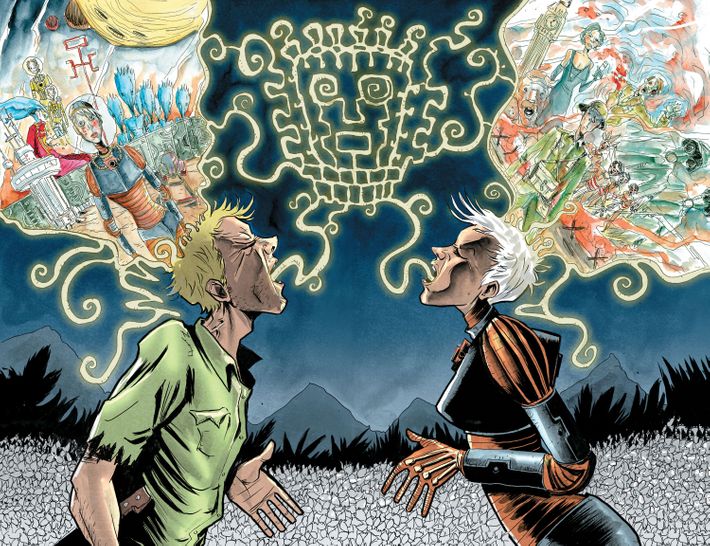
Ah, the quest for eternal life. Is there a more worn-out trope in speculative fiction? You can’t toss a rock in a room of sci-fi and fantasy stories without hitting some tale about someone searching for the Fountain of Youth or a secret serum to stave off death.
But what if you turn that concept on its ear? What if you create a tale where immortality is the beginning of the story, not the end? What would a world look like when death becomes a thing of the past? Those are the questions writer Scott Snyder and artist Jeff Lemire will be exploring in a brand-new graphic novel, which we’re honored to exclusively announce here on Vulture — AD: After Death. Image Comics will put out the single-volume novel in November 2015, and it will be the first-ever collaboration between two of the biggest and most-respected creators in comics today.
Snyder currently writes the perennially best-selling Batman for DC Comics and has also penned eerie hits like American Vampire and Wytches. Lemire has generated a constant buzz of critical acclaim for his work as a writer/artist on Vertigo’s Sweet Tooth and Trillium. With a pedigree like that, you can be sure that whatever AD: After Death ends up containing, it’s likely to be strange, thrilling, and much-discussed. I chatted with Snyder and Lemire about their book, comics they haven’t read but totally should have, Tuck Everlasting, and much more.
I know AD: After Death is still in an embryonic stage, but what’s the basic gist?
Scott Snyder: The story came from an idea I was discussing with Jeff a while ago that centers around this notion of a discovery of a genetic cure for death. I’ve always been fascinated with myths of the Fountain of Youth and immortality. It’s a theme that runs through a lot of stuff I write. So, I was talking to Jeff about doing a book that could potentially give a big, robust, heartfelt, science-fiction take on a world where death is actually curable.
Jeff Lemire: What’s really interesting about the project and what reached out to me the more we talked about it wasn’t just the idea of someone cheating death or whatever — it was more that that was the starting point for the story. It’s about what happens next. What kind of life or lives do you live after that?

Snyder: You get to build an entire world free of death and completely built and predicated on this notion that all these things that keep you up at night — running out of time, your kids growing up too fast, what if you’re in the wrong career, what if you’re married to the wrong person, what if you should be living somewhere else — you have all the time in the world to try all those things! All of that’s possible! So what about starting from that point and getting to sort of wander through all the things that seem so enticing and see how they really play out?
Why are you so fascinated with searching for the Fountain of Youth, Scott? Were you a conquistador in a previous life?
Snyder: [Laughs.] If only! If only! I think it comes from — it’s the reason I like so much horror. Ever since I was a kid, I’ve just had this tremendous fear. I remember almost exactly when it hit me. It was right after one of my grandparents — my grandmother on my father’s side — passed away. We were driving back from the funeral, and I remember this sense of terror of knowing that this was all it was. This terror of, What if there’s nothing after that? Being an anxious kid, it’s something that’s always been there for me. I don’t know why.
Jeff, when did Scott approach you for the story?
Lemire: I believe it was gonna be a short story or a one-shot. He’d been talking to another artist about it, then he told me about it and I really loved the idea, and I said to him, “Y’know, if anything ever happens and that other person can’t do it for whatever reason, I’d love to do that.” And then it kind of expanded from that shorter thing into something bigger. The more we talked, the more Scott realized how committed I was to the idea. So, over the last year, it really kinda grew, and then in the last three or four months, it became something we were definitely gonna do. We shaped it a bit more. Then we both went to the U.K. in November for a festival and flew over together, so we had seven or eight hours on the airplane to really focus and talk about it. [Laughs.] Forced work up there.

No better time to discuss mortality than while you’re crammed inside a flying tin box over the Atlantic Ocean.
Snyder: [Laughs.] I mean, it’s one of those ideas where — some things are short and some things are long, and for me, it was one of those where I kept trying to cram it into a notion of a short story for myself, and then, talking to Jeff, I realized how central it is to a lot of the things that I love to write about. Almost kind of a burned-down, core story that could be bigger than what I thought it was. Also, I’ve never really had a chance to do something more expansive in this way. The format of it is gonna be a graphic novel. So, for me, getting a chance to flex some of the muscles I haven’t flexed in prose, having room in a book that isn’t serialized, and getting to work with someone like Jeff, who’s such a consummate storyteller in his own right, it’s a different sort of project than anything I’ve been able to do.
Lemire: I think it was just what Scott was saying. I’ve done graphic novels before on my own, but Scott hasn’t! All of his comics, unless I’m wrong, Scott, have been serialized. There have been collections of his work from American Vampire or Batman, but this is his first time doing a stand-alone piece of work that can be as long or as short as he dictates. You don’t have to be a slave to the monthly grind of a cliff-hanger every 20 pages. Just seeing Scott work in that larger format, I think, will be really interesting.
Are there any homages to Marvel Comics’ Paradise X? Y’know, that story where people in the Marvel universe can’t die anymore?
Lemire: I’ve never read it.
Are you serious? It’s the only other big comics story about death being cured!
Snyder: That’s Marvel, dude!
I know it’s Marvel! What, you can’t read anything written by the competition?
Snyder: [Laughs.] I obviously haven’t read it, either. Are we totally ripping it off?
No, no, definitely not. How about other immortality stories? Were you a fan of Methuselah’s Children or Tuck Everlasting?
Snyder: Oh yeah, 100 percent. Those stories have always been resonant with me for some weird reason. Tuck Everlasting, I remember reading [it] in grade school. Same thing with Peter Pan, which was one of those stories that captured my imagination. I went back and read J.M. Barrie when I was in college, also. Watching Indiana Jones and the Last Crusade with my kid, I was looking at it and, y’know, it gets under your skin as well! For me, I just think it’s — I don’t know, I’ve always been attracted to writers [who deal with these themes], also. I remember hearing Cormac McCarthy talk about it, making fun of the fact that all he reads [is] books about death. But in some ways, at least for me, it’s comforting to write about it or to explore the most scary or wondrous aspects of that notion.

Jeff, you got a lot of praise for your 2013 sci-fi miniseries Trillium, which famously played with format and forced the reader to turn the printed comics issues upside-down and backwards. I know you’re not writing AD: After Death, but can we expect anything similarly insane in the artwork?
Lemire: [Laughs.] No, I think it’s good for me to have something long-form that I’m not writing, because it forces me to not repeat myself, y’know? To have someone else’s aesthetic and ideas affecting it. Just by virtue of channeling Scott and visualizing his ideas and things. But I do love the language of comics and playing around with that in my own things, so I’ll find some way to do that here, too.
Snyder: Three-page fold-outs!
So is it liberating, as an artist, not to be stuck in your own head with the nutty ideas you’d get if you were writing the story, too?
Lemire: No, y’know what, I’ll probably get just as lost once I get into it. [Laughs.] I’m sure I’ll read Scott’s script and come up with the most complicated ideas I can apply to it and throw them to him and see if he wants them or not. I’ve already got a couple that I haven’t told him about. I’m sure I’ll drive myself crazy. [Laughs.] That stuff keeps me challenged and fresh. Playing with format. Drawing a comic every day, it’s just so grueling and time-consuming. It’s very tedious, really. So I’ve gotta start playing. If I stop playing, the work gets boring.

